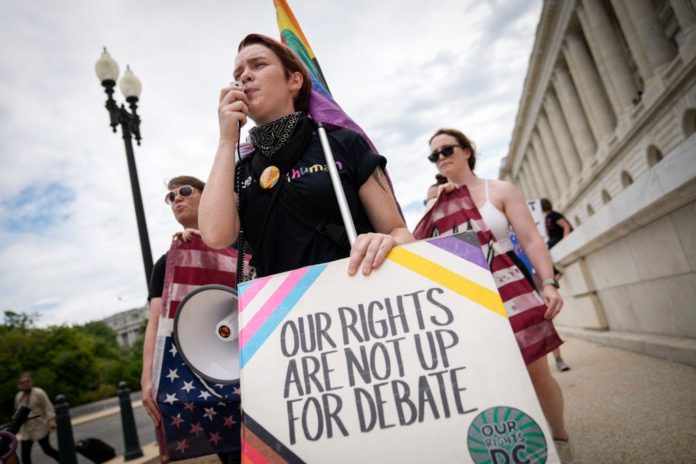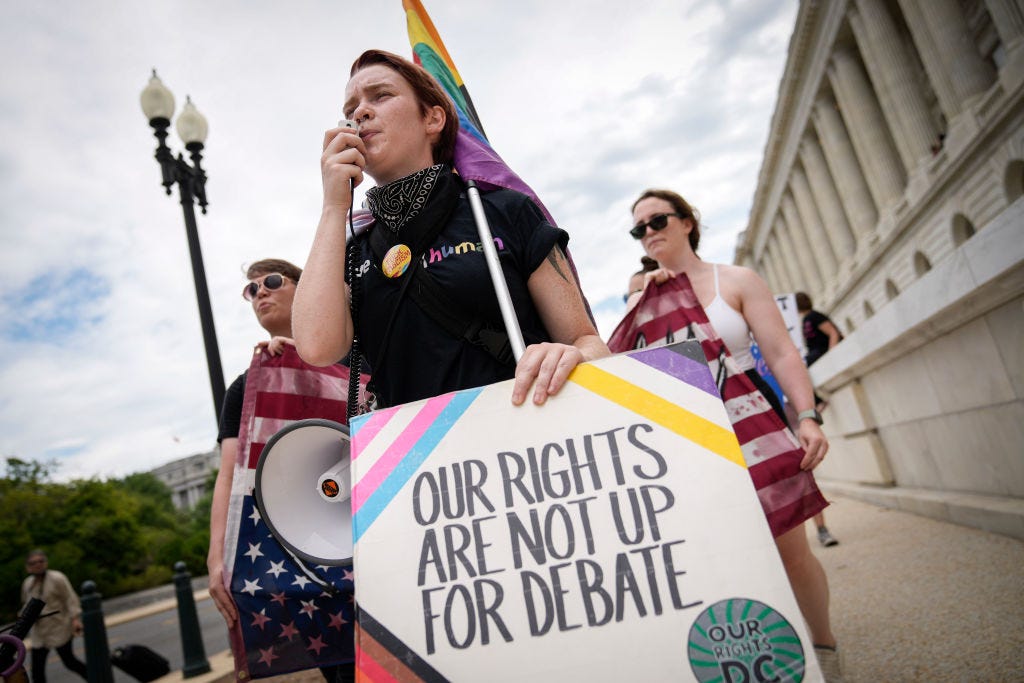Five Senate and House committees spent more than 16 hours earlier this month holding hearings on one of the most contentious party-line issues of the day: the Supreme Court’s decision in Dobbs v. Jackson Women’s Health Organization overturning Roe v. Wade.
The moment that received the most widespread attention didn’t involve Dobbs or abortion, but was an exchange in a Senate Judiciary Committee hearing between Republican Sen. Josh Hawley and Berkeley law professor Khiara Bridges over the latter’s use of the term “people with a capacity for pregnancy.” Even though the rest of the hearings, which included testimony from and questions to 25 witnesses, were filled with predictable partisan talking points—both parties accused each other of radicalism and being out of touch with the American electorate—the debates did provide insight on what the fault lines of the abortion debate may be for the coming months and years.
Perhaps receiving the most media attention since the Dobbs decision have been state abortion exceptions addressing the health and life of expectant mothers. In their hearings, members of Congress and witnesses contested the efficacy of these exceptions. Democrats condemned what Fatima Goss Graves, president and CEO of the National Women’s Law Center, called “vague, evolving, and even sometimes conflicting state laws” in the House Oversight and Reform hearing. According to Illinois Sen. Dick Durbin and numerous other Democrats, these laws have only “insufficient and confusing exceptions for the life of the mother.” As a result, they alleged, doctors are waiting to treat patients for ectopic pregnancies, miscarriages, and other pregnancy complications, and access to miscarriage-causing drugs for conditions entirely unrelated to pregnancy is being limited.
Abortions are medically necessary “every single day,” according to Dr. Colleen McNicholas, chief medical officer for Planned Parenthood of the St. Louis Region and Southwest Missouri. But, faced with new state laws, “Physicians … are literally calling hospital attorneys, who, in some cases, tell them to wait until there is a higher chance of death before intervening,” testified Dr. Jack Resneck, president of the American Medical Association, in the Oversight and Investigations Subcommittee of House Energy and Commerce hearing. “There’s not a line in the sand when someone goes from being totally fine, walking around, talking, smiling, to actively dying,” Dr. Nisha Verma, fellow at Physicians for Reproductive Health, said. “It’s a continuum. What I need to do, as a doctor, is to intervene earlier in that continuum to keep that person safe and healthy, but the laws are making it really unclear about whether I can do that.”
Republican witnesses challenged all of these claims. Dr. Christina Francis, CEO-elect of the American Association of Pro-Life Obstetricians and Gynecologists, said treatment for ectopic pregnancies and miscarriages is distinct from abortion, and, even in cases when the life of the woman is threatened by other complications, abortion is not necessary. She claimed that, while pre-viability terminations of pregnancy are sometimes necessary and will, by definition, result in the death of the unborn child, such procedures can respect the unborn child and, hopefully, deliver it intact. “State laws banning elective abortion are not banning procedures in and of themselves, they’re banning procedures with the intent to end the life of the fetal human being,” she said, meaning medically necessary treatments would be safe. However, most state laws are not so clear.
Another issue that will remain the center of national attention: crisis pregnancy centers (CPCs), which were alternately attacked as “fake clinics” and defended as vital support for women and families. Democrats like Pennsylvania Rep. Mary Gay Scanlon called the centers “a well-funded arm of the anti-abortion movement” that employ “deceptive and coercive tactics and medical misinformation.” They pushed for regulation in line with Sen. Elizabeth Warren’s recent sharp comments and legislation. (Along with other Democratic lawmakers, Warren introduced a bill that would fine CPCs for any undefined “disinformation” and encourage Google to remove them from search results.) They also condemned the GOP and the pro-life movement more broadly over failing to provide, or actively resisting, support for women and children, pointing to lack of Medicaid expansion in red states and various social spending bills.
To challenge these attacks, Republicans brought in several CPC directors as witnesses to testify about the range of medical, economic, and social services they provide and the violence they have recently faced. Brandi Swindell, founder and CEO of Idaho’s Stanton Healthcare, described her center’s pre- and post-natal education programs and its free, 18-month support program to the Senate Committee on Health, Education, Labor, and Pensions. Heidi Matzke, executive director of Alternatives Pregnancy Center in Sacramento, testified that the local Planned Parenthood refers patients who want to keep their pregnancies to her center. It has a “full medical staff,” including an OB/GYN who formerly performed abortions.
Republicans also expressed interest in further supporting mothers and children through other means. “Family planning opportunities need to be expanded and mothers need greater access to services that will support them and their baby throughout, during, and after the pregnancy,” Kansas Sen. Roger Marshall said.
A third point of contention is the possible effect on other currently constitutionally protected rights. Since the Dobbs decision, Democrats (and some Republicans) have worried that other Supreme Court decisions could fall by the same legal reasoning. That’s why Democrats invited Jim Obergefell, the named plaintiff in the landmark same-sex marriage case Obergefell v. Hodges, to testify before the House Judiciary Committee. They frequently cited Justice Clarence Thomas’ concurrence in Dobbs, which pushed for the Supreme Court to overturn its substantive due process precedents, including Griswold v. Connecticut (protecting a right to contraception), Lawrence v. Texas (protecting a right to private, consensual sexual activity), and Obergefell v. Hodges (protecting a right to same-sex marriage).
Thomas “laid the groundwork for a radical reshaping of our fundamental liberties,” New York Rep. Jerry Nadler said. Democrats also raised concerns about the right to interstate travel, a right currently protected but possibly challenged by red state attempts to limit travel for abortions. Durbin portrayed a future where legislators “turn their state borders into Checkpoint Charlies.”
Republicans and their witnesses, on the other hand, repeatedly pointed to Justice Samuel Alito’s assurance in the Dobbs majority opinion that no other rights are at risk. Catherine Glenn Foster, president and CEO of Americans United for Life, took a more interesting approach: “Justice Thomas … is not seeking to strip away rights. He is simply seeking to more firmly ground them in our nation’s Constitution.”
Other points of conflict included political violence related to abortion, disproportionate effects of abortion restrictions on minorities, and the state of democracy itself in light of a major Supreme Court decision turning abortion law on its head for the second time in 50 years.
The last of the three, in particular, undergird new legislation from both sides. Republicans stressed that “the Supreme Court has affirmed the American people’s right to speak through their elected officials and enact laws to protect unborn children,” as Washington Rep. Cathy McMorris Rodgers put it. NYU law professor Melissa Murray, on the other hand, argued, “To ask the states to decide our most essential freedoms is essentially to make all of us supplicants to the government. That cannot be what the framers of the Constitution imagined.”
Thus, fights over specific legislation continue. The House passed the Women’s Health Protection Act, but it was filibustered in the Senate. This bill would create a statutory right to essentially unrestricted abortion prior to fetal viability, limiting later abortions to cases where the life or health of the mother is threatened. (The Supreme Court historically interpreted “health” quite broadly.) Democrats in the House and Senate have introduced the Equal Access to Abortion Coverage in Health Insurance Act, which would repeal the Hyde Amendment. Republicans in the House and Senate have introduced a 20-week ban (previously passed by the House in 2015 and 2017), a six-week ban, and a ban beginning at conception. House Minority Leader Kevin McCarthy has expressed support only for a 15-week ban, and Senate Minority Leader Mitch McConnell walked back his comments calling a national ban “possible.”









